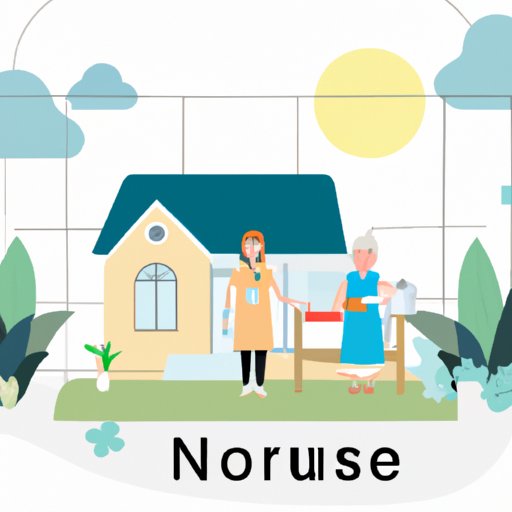Introduction
Home health nursing is a specialized field of nursing that focuses on providing nursing care to patients in their homes. Home health nurses are responsible for managing and coordinating patient care and providing direct nursing care to patients. They work with other healthcare professionals to provide comprehensive care to their patients.

Interview with a Home Health Nurse: A Day in the Life
To get a better understanding of what home health nurses do, we interviewed Jane, a home health nurse who has been practicing for 10 years. Here’s what she had to say about her typical day.
Jane starts her day by reviewing her patient list and making sure she has all the necessary supplies and equipment for her visits. She then heads out to visit her patients. During her visits, she assesses the patient’s condition, administers medications, teaches the patient and family members about the disease process, and provides emotional support. After each visit, she documents her findings in the patient’s medical record.
Jane says that one of the biggest challenges she faces is dealing with difficult patients. She also finds it challenging to manage her heavy workload while still providing quality care to her patients. Despite these challenges, Jane says that the rewards of home health nursing far outweigh the challenges. She loves being able to build relationships with her patients and their families and knowing that she is making a difference in their lives.
Exploring the Role of Home Health Nurses in Patient Care
Home health nurses play an important role in patient care. They provide a variety of services, including physical assessments, wound care, teaching and education, medication management, and emotional support. Home health nurses also work closely with other healthcare professionals, such as physicians, therapists, and social workers, to coordinate care and ensure that the patient receives the best possible care.
Communication between home health nurses and patients is critical in providing quality care. Home health nurses must be able to effectively communicate with their patients, understand their needs, and provide appropriate care. Home health nurses must also be able to collaborate and communicate with other healthcare professionals in order to coordinate patient care.
What Does it Take to Become a Home Health Nurse?
Becoming a home health nurse requires a certain set of skills and qualities. Educational requirements include a diploma or degree from an accredited nursing program, as well as passing the NCLEX-RN exam. In addition, many employers require home health nurses to be licensed and certified in their state. Personal qualities such as compassion, communication skills, problem-solving skills, and organizational skills are also essential.
The Benefits of Home Health Nursing
There are numerous benefits to pursuing a career in home health nursing. Home health nurses have the flexibility to choose their own hours and work schedules. They also have the autonomy to make decisions and take responsibility for their patients’ care. Additionally, home health nurses can work in a variety of settings, such as hospitals, long-term care facilities, and private homes.

Common Challenges Faced by Home Health Nurses
Despite the many benefits of home health nursing, there are also some common challenges. Home health nurses often work in stressful and physically demanding environments. They also face a heavy workload, which can be difficult to manage. In addition, they may encounter difficult patients who may be resistant to treatment or uncooperative.

The Impact of Home Health Nursing on Quality of Life
Home health nursing has a positive impact on the quality of life of patients. By providing nursing care in the home, home health nurses improve access to care for those who may not otherwise have access. This can lead to improved outcomes and enhanced quality of life. Home health nurses also provide emotional support and education to patients and their families, which can reduce stress and anxiety and improve overall wellbeing.
Conclusion
Home health nursing is a rewarding and challenging field. Home health nurses play a vital role in patient care by providing direct nursing care and collaborating with other healthcare professionals. Becoming a home health nurse requires a certain set of skills and qualities, as well as a commitment to providing quality care. Home health nurses enjoy the autonomy and flexibility of their jobs, as well as the positive impact they have on their patients’ quality of life.
(Note: Is this article not meeting your expectations? Do you have knowledge or insights to share? Unlock new opportunities and expand your reach by joining our authors team. Click Registration to join us and share your expertise with our readers.)
